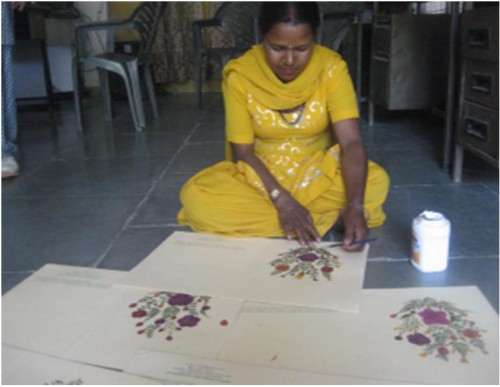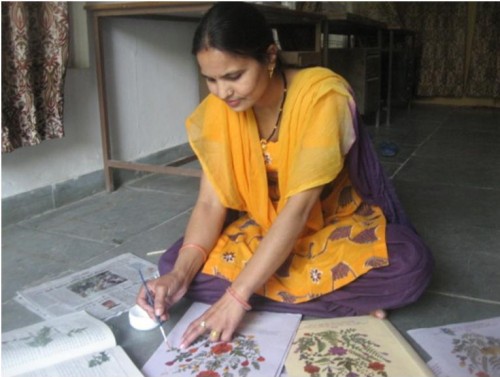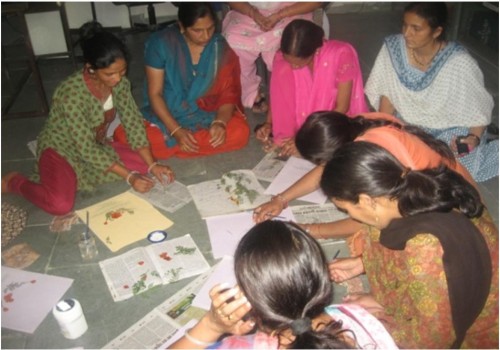Hill Women Learn To Earn The Eco-Friendly Way
Puja Devi, 30, watches with satisfaction as her young son gulps down his glass of milk and then reaches for his satchel, ready to go to school. For some months
Puja Devi, 30, watches with satisfaction as her young son gulps down his glass of milk and then reaches for his satchel, ready to go to school. For some months now, the happy mother has been able to provide milk for her son every day, a far cry from earlier times when there was hardly any money to even put food on the table, let alone afford the fees to the nearby private school.
Just last year, Puja and her husband, Raj Kumar, 34, were struggling to eke out an existence as farm labourers. Not owning any fertile land, they had no other source of income to fulfill even their basic needs. “We could not even afford to send our only child to school,” recalls Puja, who hails from Sauli village in Uttarkashi district of the hill state of Uttarakhand in north India.
Then she learnt of a training programme that was assisting rural women to earn a living by making different kinds of handicrafts using the local flora. She enrolled in the programme and spent the next few months learning the craft. But this was no easy task, as Puja discovered. Making handicrafts was delicate work that required a lot of practice, patience and a sure hand. But she persevered ignoring the skepticism of neighbours who felt she could be better employed doing farm work.
“After finishing the housework, I would go to the jungle in search of colourful flowers and leaves and return home with armloads of a good assortment,” she recalls. The next few hours would be spent in laborious concentration, trying to master using these natural materials to make stationary. Puja’s dedication and grit are evident from the fact that today the file covers and folders she makes are in great demand. “I get Rs 12 (US$1=Rs 44.8) for each file cover and make around four to five covers in a day,” she states.

Uma Joshi, 35, of Naugaon village, also took control of her life by carving out a successful career as a handicraft artisan. She can make an incredible 150 file folders and picture hangings per month. “Making use of the local flora, I make folders and decorative wall hangings. Having a means of livelihood gives me purpose and respectability in my community,” she says proudly. “I earn between Rs 1,000-2,000 per month and have enrolled my son in a good private school.”

Using eco-friendly stationary products such as file covers and folders has become quite a rage in the corporate world that likes to be associated with the right causes. And this has worked out well for scores of village women in Uttarakhand, who are able to earn a decent living making these products. Handicraft as a livelihood activity was introduced in the Naugaon area of Uttarkashi district, in west Uttarakhand, one of the most backward regions of the state, by the Himalayan Action Research Centre (HARC), a local NGO, in 2007.
Due to low levels of literacy, lack of professional skills, time constraints and limited access to information on employment opportunities, women in these parts have few avenues for income generation apart from agriculture. HARC’s initiative targets women not engaged in farm activities and currently over 30 women have been fully trained in making files, folders and photo frames. Those with exceptional skills like Uma also make wall hangings and serve as master trainers for other women. “HARC decided to build the skills of women and girls in some handicraft to provide new income-generating opportunities in the area,” says Chhaya Kunwar, the NGO’s Senior Programme Coordinator. “The activity selected was making files, folders and wall pictures out of handmade papers and natural dried leaves and flowers, thus preserving crafts as a living heritage.”
A total of 35 women were selected at the start of the programme, comprising girls who were involved in household activities after reaching secondary or senior secondary level school and women not engaged in farm work. “In our country, the full participation of women in any programme depends on the support and motivation given to them at the family level. So the family members of these girls and women were also sensitised about the benefits of this activity,” Kunwar recalls.
The initial response was not promising. Many of the young women, returning home late after attending class, faced criticism and resentment from their families and friends for what was perceived as wasting valuable time on a luxury they could ill afford.
Mohini Indrawan, 34, of Ohari village, who was among the first few women to be trained under the HARC initiative, recalls that people in her village had labelled her “immoral” because she left home for several hours each day to attend class. “People used to jeer and pass lewd comments at me, especially if I returned home late in the evenings. Even my own family would taunt me. Now, I am the major breadwinner in the family,” says a proud Indrawan.
“When people saw how much money I was making from producing these handicrafts, they started thinking differently,” adds Joshi, with a laugh. “Fortunately for me, my husband, who is a social worker, supported me from the very start which gave me the confidence to carry on.”
Here’s what the 25-day training programme covers: The women are taught design and colour combination schemes, they learn techniques of collecting and drying flowers and leaves, which are pasted on to the folders, files and photo frames.

In addition to this training, HARC also helps them to start up cooperative businesses, prepare an annual business plan for their activities, and facilitate the initial building of market linkages. Today, the women run the business all by themselves. “Our products, especially conference folders, are in great demand by different government departments, banks, civil society groups and corporates,” informs Joshi.
Indeed, the women engaged in this work are happy they could muster the courage to defy their family and friends to learn the skill. According to many of them the best part of this kind of employment is that they can work from home, as and when they find the time.
Women like Puja have been empowered both financially as well as socially. “I am more independent now. My work capacity has increased as have my earnings, and I can look after my family better,” she says proudly.
This story made me
-
97
-
121
-
89
-
167













